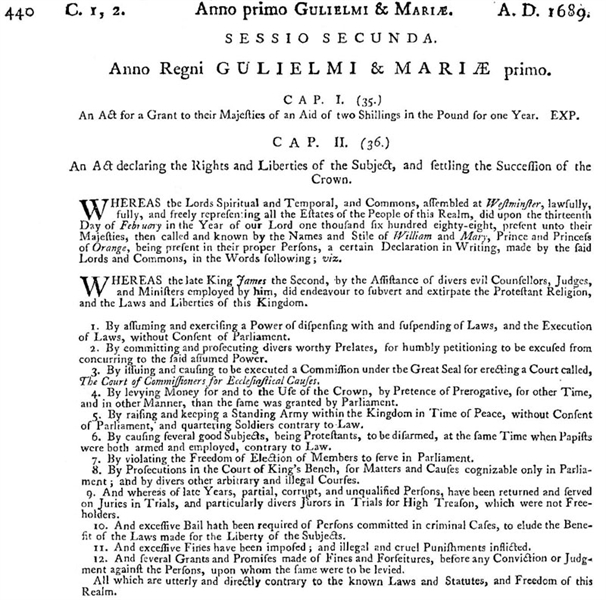
Does Britain Need a Bill of Rights?
‘Adam Kissel – former vice-president of Fire – the Foundation for Individual Rights in Education, the leading American campaign group for freedom of speech – starts his ‘Free Speech England Tour’ in Derby on Tuesday 17 March. In this short opinion piece he reminds us that, as well as the Magna Carta of 1215, Britain once had a ‘Bill of Rights’ established in 1689 as a result of the ‘Glorious Revolution’ that was the inspiration for the Virginia Declaration of Rights in 1776.
‘Britain had been so bad for fundamental rights in the late seventeenth century that the people got together to establish a Bill of Rights. Four score and seven years later, Britain had been so bad for fundamental rights that Americans took up arms for independence. Today, a proud Virginian in the tradition of George Mason and Thomas Jefferson, I am on a free speech tour in Britain because the country has become too terrible in its rejection of fundamental rights.
The examples are horrifying and especially horrifying to Americans I know. The UK is arresting and jailing its people for singing songs or tweeting jokes. Its universities and their student unions refuse to tolerate disapproved opinions. (See the website of the magazine spiked and its Free Speech University Rankings for a parade of truly horrible examples.) The British government has forced a major newspaper to physically destroy information and has been trying to force universities to pre-screen speakers and speeches on campus.
Many Americans see these outrages and cringe. For us, free speech is a fundamental human right that we have figured out pretty well over the past century in particular. At the time of the First World War, dissenters in the Supreme Court determined that the “marketplace of ideas” metaphor—a free marketplace where every idea, every expression, has its fair chance—is better than censorship. In the midst of the Second World War, the same court decisively agreed that it is most patriotic of all for the country to respect someone’s seemingly unpatriotic but principled refusal to pledge allegiance to the nation’s flag.
In comparison, the UK looks almost entirely lost. In the name of patriotism, British values, and anti-extremism, the British government is promulgating a regime of monitoring and censorship that entirely undermines what little is left of the British tradition of liberty. Under this regime I cannot recognize England as a forerunner of American freedom.
I do not mean to say free speech has no champions left in England. The incisive Brendan O’Neill and others at spiked, the group Academics for Academic Freedom, and a few additional advocates have been reminding England of its lost tradition of liberty. They have been explaining why it is so bad for England that its people have forgotten how to advocate for their basic rights.
I worry, however, that the British people also have forgotten how to listen to such voices with an open mind. British “tolerance” is not, as Americans often well understand (and also often forget) it should be, a two-way street. History is rife with examples, as John Stuart Mill pointed out in On Liberty, of the majority being so sure of itself that it has oppressed the minority view, only to realize a generation later what it is like to be in the minority or to be rather decisively proved wrong.
Today’s oppressors in Britain will one day be the oppressed unless the country fundamentally changes its neo-Puritanism and fully tolerates the widest possible range of perspectives and views, songs and tweets. Then there might be full and free debate for all in each generation. The alternative, which is the country’s current way of doing business, is to send disapproved minority viewpoints into the shadows where, unchallenged, they will polarize and become “extremist.” The current regime has planted the seeds of its own destruction.
I will be in England all week to present the better alternative and, hopefully, to make common cause with the remnants of the fast-disappearing British tradition of freedom.’
Adam’s Twitter handle is: @adamkissel
He is speaking at the East Midlands Salon on Tuesday 17 March and at the Sheffield Salon on Wednesday 18 March.


